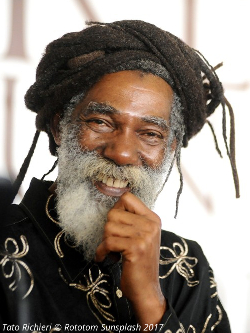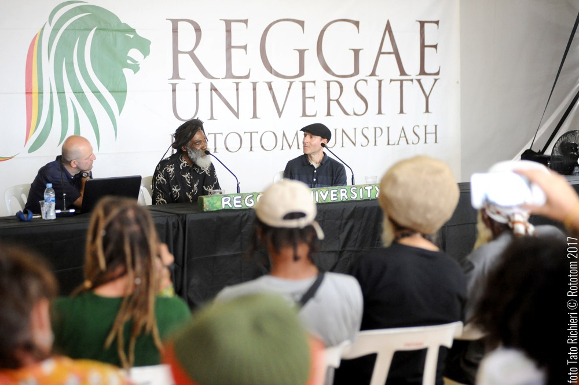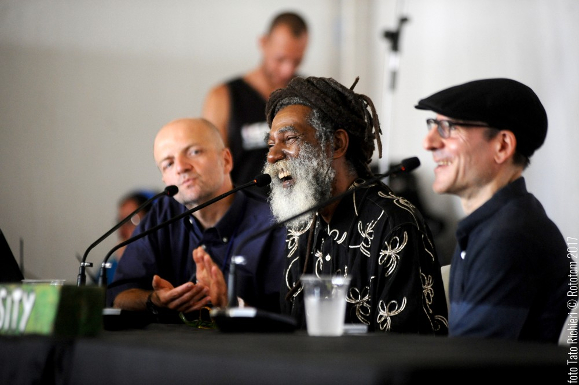Articles about reggae music, reviews, interviews, reports and more...
Deep Roots History at the Reggae University: The Music of Mento and Don Carlos

Deep Roots History at the Reggae University: The Music of Mento and Don Carlos
Don Carlos shares his journey in reggae while the film Pimento and Hot Pepper traces the first recorded Jamaican music.
Sampler
An afternoon of fascinating history greeted visitors to the Rototom Reggae University’s fourth session. The audience learned about reggae and its ancestral lineage, both on film and in person.
Proceedings began with a screening of Rick Elwood’s documentary ‘Pimento and Hot Pepper – the Mento Story’. Featuring interviews with Tuesday’s Main Stage opener Toots Hibbert, Sonny Bradshaw, Monty Alexander, Ernest Ranglin, Miss Lou, and Edward Seaga, this lively, moving film traced the history of Mento, Jamaica’s first indigenous recorded folk music.
The movie shone a light on this oft forgotten forefather in the pantheon of Jamaican popular culture – and key players such as Lord Tanamo, Bedasse and Ivan Chin, the Jolly Boys and the Litiz band. From its birth as an Afrocentric alternative to ballroom dancing, through its heyday leveraging the popularity of Trinidadian calypso, eclipse by ska and sound system, then latter-day resurgence, Mento deserves all the applause the documentary received.
 The lessons continued when regular panellists David Katz and Pier Tosi led a conversation with previous night’s Main Stage star performer, Don Carlos. The flawless voiced singer-producer ambled down the tent’s central aisle to a hero’s welcome. Speaking in a far deeper pitch than his mellifluous vocals, Carlos seemed visibly tickled by the panel’s knowledge of his catalogue.
The lessons continued when regular panellists David Katz and Pier Tosi led a conversation with previous night’s Main Stage star performer, Don Carlos. The flawless voiced singer-producer ambled down the tent’s central aisle to a hero’s welcome. Speaking in a far deeper pitch than his mellifluous vocals, Carlos seemed visibly tickled by the panel’s knowledge of his catalogue.
The audience heard sound-clips and reminiscences of Carlos’ early days aged 14, singing harmonies with Errol Dunkley for Joe Gibbs; his brief tenure in Black Uhuru; and his solo career which took off at King Tubby’s studio in the rough Waterhouse district. Of his beginnings and first material for Black Uhuru, he said “Those were the days when I started to see Rastafari. There were a lot of destructions and distractions. I could have chosen a different path.”
When Black Uhuru members Duckie Simpson and Garth Dennis migrated towards Trenchtown, the Wailers and Wailing Souls, Don stayed in Waterhouse and went solo. Some extraordinary 70s recordings for his friend Joe Morgan at King Tubbys were released under the name Jah Carlos by New York’s Bullwackies (along with Morgan’s own superb Basement session). Carlos credits learning the guitar in progressing from initial vocal influence Delroy Wilson to developing his voice in what is now called the Waterhouse style.
He became emotional when describing how a chance encounter with UK soundman/producer Fatman at Tubbys led to massive roots lovers hit Late Night Blues. Engineered by singer Pat Kelly, Don prayed to Jah for inspiration for lyrical inspiration. “That was the starting point for my life”.

The song facilitated a less satisfying link with preeminent early 80s producer Junjo Lawes. Carlos felt he was side-lined in favour of the big deejays of the day. He viewed many of the albums Junjo rush-released when the singer left for rivals Channel One as unfinished. Carlos praised fans over producers for helping him through his career. “I thank you for my support”.
He had fond memories of his singing partnership with his friend from St Elizabeth named Gold. Sadly, Gold was shot and paralysed in Washington DC which brought their duo to an end. Carlos himself eventually settled in California where, due to the friendliness and health consciousness of its people, he resides to this day, recording with musicians such as Groundation.

When an audience member asked the legend to sing live into the microphone he laughed “I’m not sure about my voice. I was so happy after my performance last night that I stayed up until 6am”. But he obliged and the session closed to rapturous cheers.
Read more about this topic
Comments actually desactivated due to too much spams
Browse by categories
Recommended Articles
Latest articles
Recently addedView all
© 2007-2026 United Reggae. All Rights Reserved. Reproduction in whole or in part is prohibited. Read about copyright
Terms of use | About us | Contact us | Authors | Newsletter | A-Z














